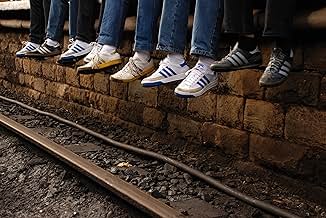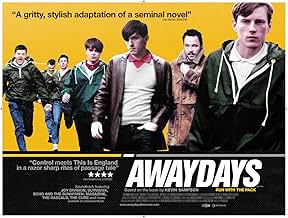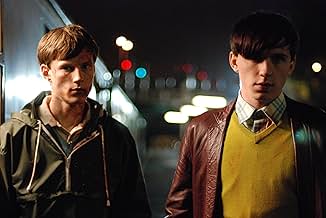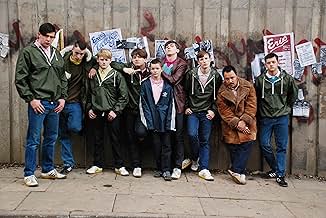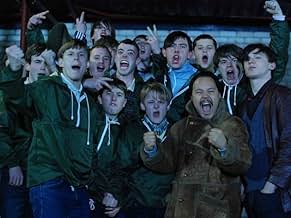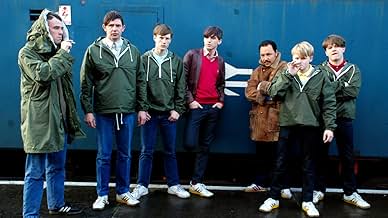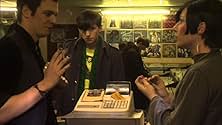IMDb RATING
5.7/10
3.9K
YOUR RATING
In the grim early years of Margaret Thatcher's premiership, also the crown years of hooliganism, the opportunities for thrill-seeking young men are what they've always been: sex, drugs, rock... Read allIn the grim early years of Margaret Thatcher's premiership, also the crown years of hooliganism, the opportunities for thrill-seeking young men are what they've always been: sex, drugs, rock n' roll, fashion, football and fighting.In the grim early years of Margaret Thatcher's premiership, also the crown years of hooliganism, the opportunities for thrill-seeking young men are what they've always been: sex, drugs, rock n' roll, fashion, football and fighting.
- Awards
- 1 win total
Michael Ryan
- Marty
- (as Micheal Ryan)
Anthony Borrows
- Pee Wee
- (as Anthony Burrows)
Holliday Grainger
- Molly
- (as Holliday Granger)
Lianne Sorsa
- Suzy
- (as Lianna Sorza)
Dannielle Malone
- Janie
- (as Danielle Malone)
Featured reviews
This is has got to be one of the most bizarre movies I've seen in a very long time . It has the gloomy , gritty , realist kitchen sink drama you've seen a million times from every Ken Loach film . Somewhat conscious of this Pat Holden then introduces a contemporary soundtrack tothe film , a soundtrack that seems to go on and on . According to the wikipedia a grand total of 28 tracks are used throughout the running time . You can't get enough of doom laden nihilistic songs , tunes to slash your wrists to ? Then you'll probably enjoy AWAYDAYS . Oh and you're also a latent homosexual who can't catch enough homo erotic glances from male characters in a movie ? In that case you might just believe this is a gay , kitchen sink , pop video equivalent of GONE WITH THE WIND
These aren't necessarily criticisms and AWAYDAYS would go down very well with film students wanting to discuss kitchen sink British drama or gay cinema or wider existentialist themes . Certainly the look and feel of the movie resembles that of many classic PLAY FOR TODAY dramas but the problem is there seems to be three different type of films trying to escape
Certainly the best aspect of the film is its sense of time and place . Unlike Nick Love's remake of THE FIRM you really do believe the story is taking place in its chronological setting , so much so that Holden gives the impression that he owns a Tardis . The hairstyles and fashion and whole feel of the movie screams that it's 1979 Merseyside . However this is the only thing Holden manages to capture well and convey to the audience
It's interesting how extreme some of the reviews on this page are and after watching AWAYDAYS you'll take on board both the praise and criticism . Both sides are right in their arguments and I'm sticking by my one line summary at the top of this review
These aren't necessarily criticisms and AWAYDAYS would go down very well with film students wanting to discuss kitchen sink British drama or gay cinema or wider existentialist themes . Certainly the look and feel of the movie resembles that of many classic PLAY FOR TODAY dramas but the problem is there seems to be three different type of films trying to escape
Certainly the best aspect of the film is its sense of time and place . Unlike Nick Love's remake of THE FIRM you really do believe the story is taking place in its chronological setting , so much so that Holden gives the impression that he owns a Tardis . The hairstyles and fashion and whole feel of the movie screams that it's 1979 Merseyside . However this is the only thing Holden manages to capture well and convey to the audience
It's interesting how extreme some of the reviews on this page are and after watching AWAYDAYS you'll take on board both the praise and criticism . Both sides are right in their arguments and I'm sticking by my one line summary at the top of this review
The year is 1978; the hippies have been replaced by the punk rockers, the depressive artists following acts like Lou Reed, Ultravox and Joy Division under the ever gloomy landscape of Margaret Thatcher's reformed Great Britain. For many it was a time to put your head down and get on with it, no matter how depressing it might have been—and then for other's it was more of an opportunity to let loose; to express the frustration built up inside by the disappointing anti-climax of the nineteen-sixties revolutions; their now forgotten refrain of "all you need is love" now replaced with council flats, minimum wage and a cheap night out at the pub to somehow make up for a day's soul-crushing monotony. Yeah, it wasn't a pretty time, and some people didn't necessarily want to make it any better. Nope, rather it was not uncommon for youngsters of the time who had nothing better to do (no jobs, no prospects, and no educational benefits) to indulge in past-times akin to pouring salt in a wound or prodding at a loose tooth just for the sake of reminding yourself of your dire situation. The country had a massive abscess, and rather than going to dentist to get it seen to, the youth would seek to the anger out through arbitrary fights with rival football fans, just for the sake of it. Sure, in retrospect it might seem a little melodramatic coming from a culture that produced the moody post-punk acts of the seventies, but Awaydays seeks to marry that sense of romance, with something a little more human too.
For the most part, director Pat Holden succeeds in bringing out the potency to Kevin Sampson's novel that strives to overcome the somewhat petty, pedestrian nature of this "football hooliganism" counter-culture. The movie's first act which focuses highly on the utterly detestable and seemingly unredeemable characters who would take part in these shallow acts of psychological transference, is unsurprisingly the weakest—but what comes after is something a little more enlightening and insightful. After spending a good half hour with these chaps that you'd probably find hanging outside your local cinema harassing customer's to buy them a "bevy from the offy", Holden takes some time away from the cliché elements of Sampson's novel (domestic quibbles and teenage angst) and brings the focus onto the budding friendship of its two central characters Elvis (Liam Boyle) and Paul Carty (Nicky Bell) who are more than just drunken thugs with zero prospects.
Carty is an art-school dropout who finds a lifestyle he is suddenly attracted to in the form of Elvis who is an aspiring, romantic artist who also dabbles in a bit of thuggery and drugs to make sure he's not perceived as a "total ****". Both share a common love of girls, popular, rebellious music and of course, football—or rather, beating up football fans. Unfortunately, going by scripture set in vinyl by their Godfather Ian Curtis while this common ground brings them together for short periods of time, it also tears them apart. From the offset, Carty comes off as a day-tripping tourist in search of a few months living like common people, and Elvis as an overly self-conscious sheep who is never quite sure of what he wants or how to get it—yeah, teenagers. This in turn with Holden's persistence that his feature be brimming and truthful with the emotional roller-coaster that was teenage life of the time is going to disgruntle viewers, but only because of the subject matter, rather than the way in which he portrays such subjects. Rather, taken from a distance, Awaydays is surprisingly reflective of those troublesome years, but never succumbs to the one-track mind-frame that dominates its central characters—these guys have more faults than virtues sure, but Holden makes sure to give them more than one dimension that is fleshed out after the first act into a dynamic that is thought-provoking and insightful enough to make you forget their misgivings.
What really helps to keep Awaydays afloat however are the performances of its central cast who, spearheaded by the charismatic and nuanced portrayals of Elvis and Carty, nail the humanist tones that echo throughout Sampson's story. So as the movie goes on, it gets to a certain point where you actually feel for these two guys and their situation—you may not like them, but they become more than just caricature thugs glorifying their right to expression by cutting up strangers' faces. Of course, there are still problems going into the film's closing stages which result largely from the melodrama associated with all this romantic tint put on the two character's plight, but when taken in context of Holden's otherwise extremely grim and bleak tale of late seventies street crime, such minor distractions fail to take any major precedence. The result is a surprisingly mature memoir of a time dominated by teenage angst and rebellion against a rather inhospitable society that—although flawed—works far more than it necessarily should.
For the most part, director Pat Holden succeeds in bringing out the potency to Kevin Sampson's novel that strives to overcome the somewhat petty, pedestrian nature of this "football hooliganism" counter-culture. The movie's first act which focuses highly on the utterly detestable and seemingly unredeemable characters who would take part in these shallow acts of psychological transference, is unsurprisingly the weakest—but what comes after is something a little more enlightening and insightful. After spending a good half hour with these chaps that you'd probably find hanging outside your local cinema harassing customer's to buy them a "bevy from the offy", Holden takes some time away from the cliché elements of Sampson's novel (domestic quibbles and teenage angst) and brings the focus onto the budding friendship of its two central characters Elvis (Liam Boyle) and Paul Carty (Nicky Bell) who are more than just drunken thugs with zero prospects.
Carty is an art-school dropout who finds a lifestyle he is suddenly attracted to in the form of Elvis who is an aspiring, romantic artist who also dabbles in a bit of thuggery and drugs to make sure he's not perceived as a "total ****". Both share a common love of girls, popular, rebellious music and of course, football—or rather, beating up football fans. Unfortunately, going by scripture set in vinyl by their Godfather Ian Curtis while this common ground brings them together for short periods of time, it also tears them apart. From the offset, Carty comes off as a day-tripping tourist in search of a few months living like common people, and Elvis as an overly self-conscious sheep who is never quite sure of what he wants or how to get it—yeah, teenagers. This in turn with Holden's persistence that his feature be brimming and truthful with the emotional roller-coaster that was teenage life of the time is going to disgruntle viewers, but only because of the subject matter, rather than the way in which he portrays such subjects. Rather, taken from a distance, Awaydays is surprisingly reflective of those troublesome years, but never succumbs to the one-track mind-frame that dominates its central characters—these guys have more faults than virtues sure, but Holden makes sure to give them more than one dimension that is fleshed out after the first act into a dynamic that is thought-provoking and insightful enough to make you forget their misgivings.
What really helps to keep Awaydays afloat however are the performances of its central cast who, spearheaded by the charismatic and nuanced portrayals of Elvis and Carty, nail the humanist tones that echo throughout Sampson's story. So as the movie goes on, it gets to a certain point where you actually feel for these two guys and their situation—you may not like them, but they become more than just caricature thugs glorifying their right to expression by cutting up strangers' faces. Of course, there are still problems going into the film's closing stages which result largely from the melodrama associated with all this romantic tint put on the two character's plight, but when taken in context of Holden's otherwise extremely grim and bleak tale of late seventies street crime, such minor distractions fail to take any major precedence. The result is a surprisingly mature memoir of a time dominated by teenage angst and rebellion against a rather inhospitable society that—although flawed—works far more than it necessarily should.
- A review by Jamie Robert Ward (http://www.invocus.net)
If there's one thing I have learned watching British cinema it is this: for a country that gave name to the English language, they sure know how to ruin said language. I seriously almost turned the movie off within the first 15 minutes because I could barely understand what anyone was saying. I've spent enough time in the UK to get most of the slang and whatnot, but the accents of the two main characters are just too thick. Plus, as one reviewer has already pointed out, the movie is rather bland. I think it wanted to be a slightly more dramatic version of Green Street Hooligans, but it ended up as a similar movie without much of the fighting or compelling story.
To be honest with you, I really like the idea of completely ditching the relationship between the two main characters. It's nearly impossible to follow and pretty pointless. And while I usually enjoy watching Stephen Graham do his thing, this role is a bit of a waste for him.
All in all I'd find it hard to give this a good recommendation to a friend. It's not awful, but it just feels kind of pointless. If it was more an interesting snapshot of England in the 1970's (along with the hooligan aspect) it would've worked a lot better. Throw in all the melodramatic pointlessness and it becomes increasingly less so. I guess you could watch it if you didn't have anything better to do, but that's all the endorsement I'm willing to give it.
To be honest with you, I really like the idea of completely ditching the relationship between the two main characters. It's nearly impossible to follow and pretty pointless. And while I usually enjoy watching Stephen Graham do his thing, this role is a bit of a waste for him.
All in all I'd find it hard to give this a good recommendation to a friend. It's not awful, but it just feels kind of pointless. If it was more an interesting snapshot of England in the 1970's (along with the hooligan aspect) it would've worked a lot better. Throw in all the melodramatic pointlessness and it becomes increasingly less so. I guess you could watch it if you didn't have anything better to do, but that's all the endorsement I'm willing to give it.
Tried desperately hard to enjoy this film and it seemed to start off OK but the mixed story lines, and slow moving scenes etc meant I was nodding off about half way through and found it a struggle to get to the end.
Some good bits but too jumbled and so many loose ends to really enjoy along with a damp squid of an ending that did it no favours. The sound track was probably the most enjoyable element with some decent 70's 80's tunes throughout.
As hooligan films go, bit more realistic in places than sum such as Green St which is utter tosh but not on the same level as the original film of the 'Firm' with Gary Oldman which is a classic and still the best in my opinion.
Some good bits but too jumbled and so many loose ends to really enjoy along with a damp squid of an ending that did it no favours. The sound track was probably the most enjoyable element with some decent 70's 80's tunes throughout.
As hooligan films go, bit more realistic in places than sum such as Green St which is utter tosh but not on the same level as the original film of the 'Firm' with Gary Oldman which is a classic and still the best in my opinion.
Awaydays is a very misunderstood film in some respects. Had it been made in a time when we weren't already saturated with "football hooligan" films I genuinely believe it would've been much better received. Like Alan Clarke's 1988 "The Firm" which also uses football violence as a backdrop, Awaydays is much deeper than the likes of Football Factory. It's a story about two young lads both in that gap between being at school and entering the grown up real world if you like.
The two main characters are (I'm guessing) aged about 19 and both have dreams but neither has direction. What they have in common is they both want one another's life. It's almost tragic, because neither is going anywhere really.
After initially forming a close bond (and it's suggested that Elvis has romantic feelings towards Carty) their friendship soon starts to fall apart when the underlying reality that they are nothing alike surfaces. Neither are particularly likeable character's albeit in different ways. Elvis is probably the worse of the pair but has a very likeable side to him, he's the cool one of The Pack if you like, and the hooligan side of him is only one of a few personalities he seems to live.
Awaydays is gritty, and it's northern setting fits the story perfectly. I've read a lot of other reviews commenting on how fake the scouse accents are, but the film isn't set in Liverpool it's set on the Wirral, Birkenhead to be exact and I suppose given it's location it is a little like a Liverpool accent but slightly off if that makes sense?
Anyway, if you're expecting a football hooligan film you could be sorely disappointed. If you want to watch a decent coming of age drama with a great story I would highly recommend Awaydays.
The two main characters are (I'm guessing) aged about 19 and both have dreams but neither has direction. What they have in common is they both want one another's life. It's almost tragic, because neither is going anywhere really.
After initially forming a close bond (and it's suggested that Elvis has romantic feelings towards Carty) their friendship soon starts to fall apart when the underlying reality that they are nothing alike surfaces. Neither are particularly likeable character's albeit in different ways. Elvis is probably the worse of the pair but has a very likeable side to him, he's the cool one of The Pack if you like, and the hooligan side of him is only one of a few personalities he seems to live.
Awaydays is gritty, and it's northern setting fits the story perfectly. I've read a lot of other reviews commenting on how fake the scouse accents are, but the film isn't set in Liverpool it's set on the Wirral, Birkenhead to be exact and I suppose given it's location it is a little like a Liverpool accent but slightly off if that makes sense?
Anyway, if you're expecting a football hooligan film you could be sorely disappointed. If you want to watch a decent coming of age drama with a great story I would highly recommend Awaydays.
Did you know
- TriviaDuring one scene, Elvis talks about the idea of hanging himself whilst listening to "New Dawn Fades" by Joy Division. In 1980, Ian Curtis, the lead singer of Joy Division actually commited suicide the same way.
- GoofsThe "scouse" accents of nearly all the characters are clearly fake.
- Crazy creditsThe credits thank "Nicola & Eddy at Camel Llairds". The correct spelling of this famous shipbuilder is "Cammell Laird"
- SoundtracksNag Nag Nag
Written by Richard H. Kirk, Stephen Mallinder and Chris Watson
Performed by Cabaret Voltaire, bass & vocals Stephen Mallinder
Courtesy of Rough Trade Records
- How long is Awaydays?Powered by Alexa
Details
Box office
- Gross worldwide
- $131,265
- Runtime1 hour 45 minutes
- Color
Contribute to this page
Suggest an edit or add missing content



